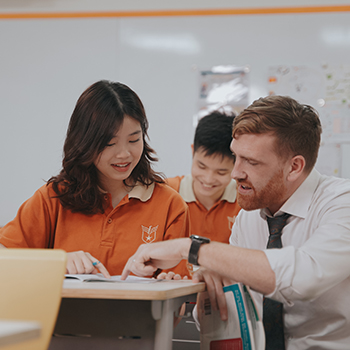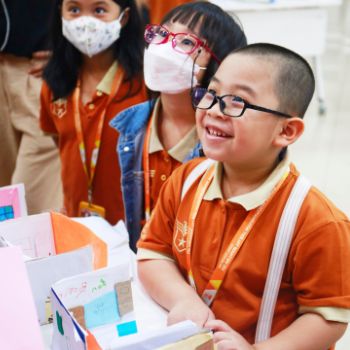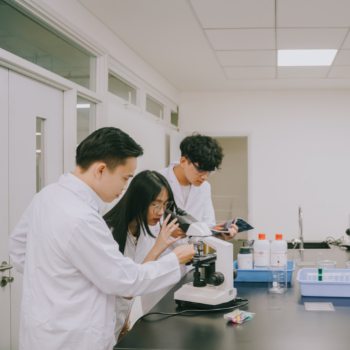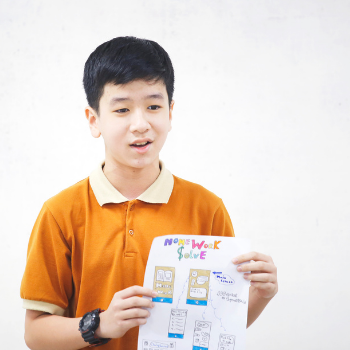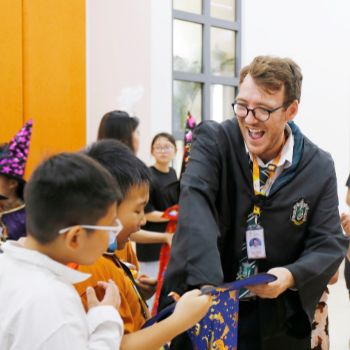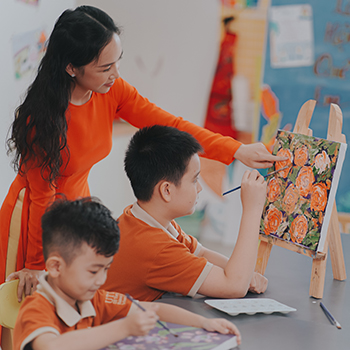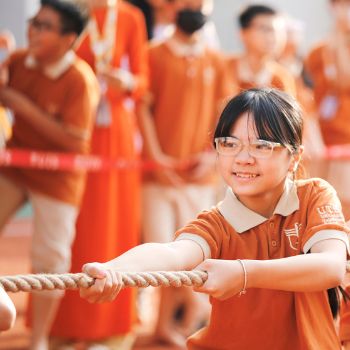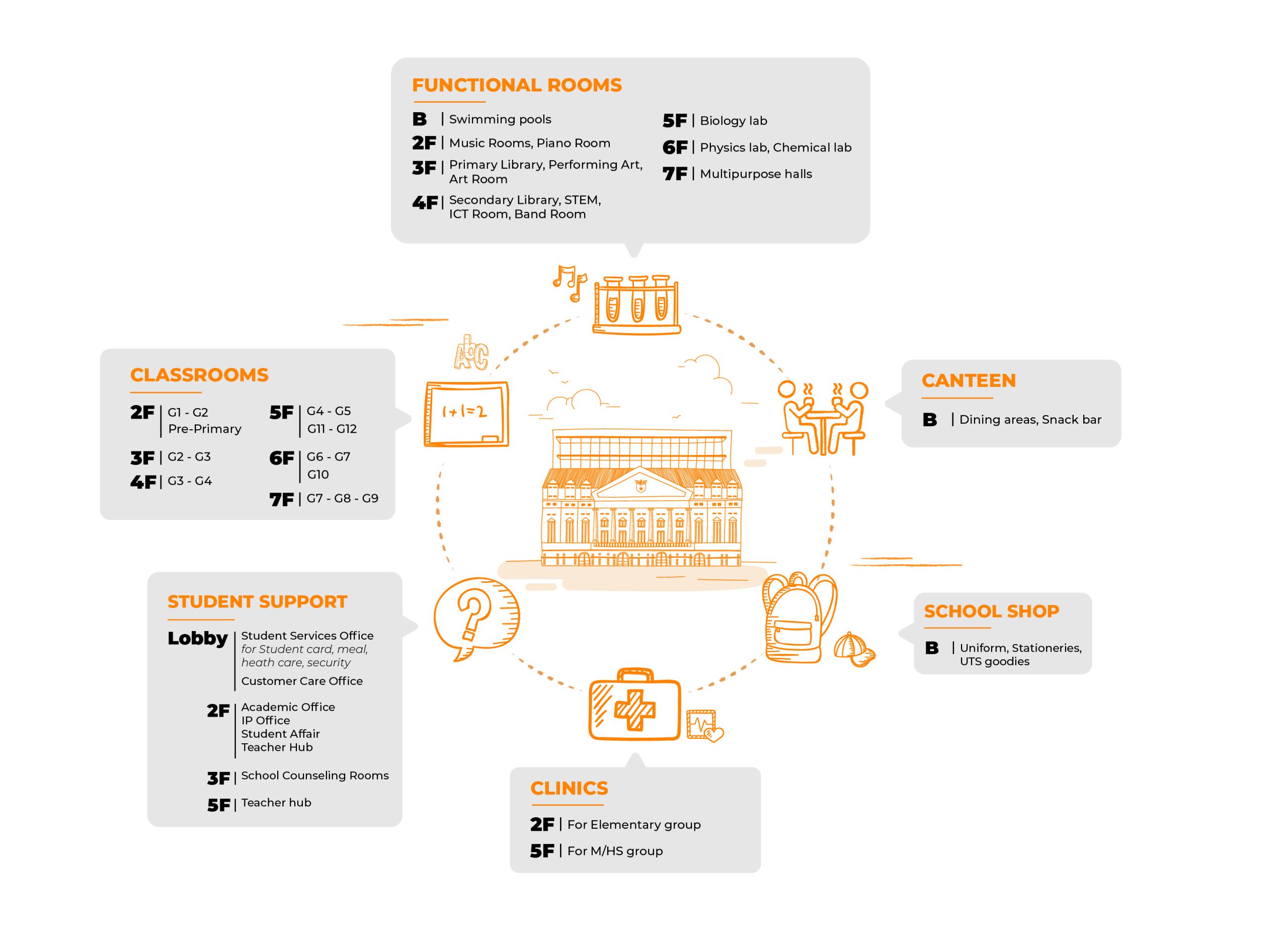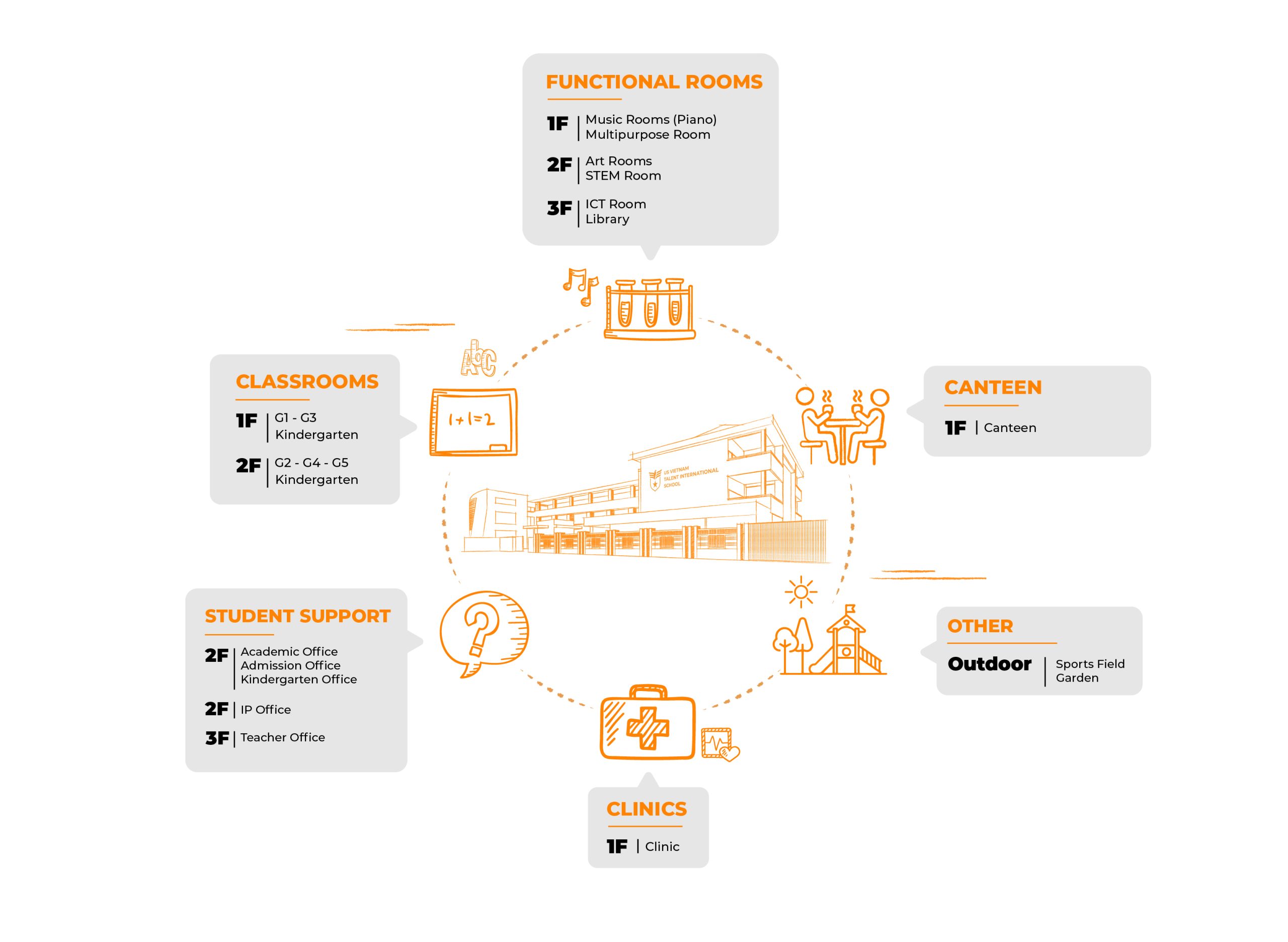Welcome back UTS-ers to the new school year of 2023 – 2024 with lots of hopes and excitement.
Starting a new academic year, you may need some time to balance out the pace of learning and school activities, especially for new students. You may face certain difficulties due to the changes in learning environment and conditions. Therefore, you should prepare carefully for a good start and great results in the school year.
Some of you may refresh your study corner which will definitely give you inspiration and the love for learning. To make you feel more excited and confident, you may want to buy new school supplies, uniforms, or even a new pair of shoes. It is also very important to set clear goals and resolutions for the new school years to motivate yourselves and make efforts to achieve the goals.
And to help you achieve your goals, UTS is providing you with an ACADEMIC GUIDEBOOK to help you master a number of basic study skills so that you can quickly catch up with the school environment most effectively. We hope the information provided in this ACADEMIC GUIDEBOOK will help you achieve your academic and personal development objectives, as well as experience the school year 2023-2024 in the most comprehensive and meaningful way.

The guidance of UTS-ers’ thought and action
INTEGRITY: UTS students keep their promises, always respect the truth, and say no to wrongdoings in society.
RESPECT: UTS students respect themselves as well as other individuals. The present world is global, and cultures are interconnected and intertwined. Therefore, students need to understand and respect other cultures while retaining national and individual identities.
COURAGE: UTS students are patient, persistent, ready to conquer personal goals and face challenges, confident to express personal views and competent at foreign language.
CONTRIBUTION: UTS students apply the knowledge and skills they have learned to benefit themselves, their families, and society.
LIFELONG LEARNING: UTS students constantly explore and learn from their surroundings, and apply their knowledge and experiences in real life.
CREATIVE: UTS students develop the spirit of innovation and creativity, and know how to develop and apply new ideas.
PUNCTUALITY
We strongly believe that being on time is very important in all activities that we do everyday like going to school, attending a meeting, going camping, etc. This helps students not only to update everyday knowledge, but also raises their awareness that complying with the school policy is respecting teachers and classmates, promoting their sense of discipline.
CLOTHING
Uniforms are designed to express the school identity and collective pride. In addition, uniforms aim to maintain equality and harmony among students. Therefore, UTS students need to wear uniforms on campus and when participating in school activities or going on trips and field trips organized by the school. Accessories, jewelry, hairstyles, makeup, and costumes for other activities are freely chosen but suitable to the school culture and Vietnamese culture.
COURTESY AND RESPECT
In the UTS community, all members should be treated with respect. Students need to understand and behave appropriately with everyone and respect differences. Good behaviors that show self-respect and respect for the community including but not limited to greeting, speaking at the right volume, using standard language, maintaining public hygiene, telling the truth, doing the right thing, and saying thank you and sorry.
Profanity is considered an inappropriate language for the school environment. Disrespect for teachers and school staff is considered a serious disciplinary violation, goes against the values of the school and will be severely dealt with.
SAFETY
Safety is always a top priority at UTS. Safety issues include the body, property and emotions of each individual and the surrounding community in all activities at school. UTS students need to keep in mind that no one has the right to hurt another in any way. They also need to recognize and protect the safety of themselves and those around them, speak up when necessary, and say no to school bullying.
1. GENERAL INTRODUCTION TO UTS EDUCATION SYSTEM
PRIMARY PROGRAM
The UTS Primary Program offers a standardized model of each value into series of “PRACTICE ACTIVITIES”. This helps train students to become useful and responsible citizens, go to school full of joy and bring out their best abilities.
UTS selectively integrates different programs into one top-quality Primary Program, including the standard optimized program by the Vietnam Ministry of Education and Training, our International Program – a thorough program that equips UTS students with the global language, and the Talent development programs that promote skills and quality development through subjects like Life Skills Education, STEM, ICT, Extensive Reading, and Experiential Learning.
MIDDLE SCHOOL PROGRAM
The Middle School program is built with the goal of giving each student the opportunity to outgrow their own outstanding abilities. The curriculum ensures to equip knowledge of foundation subjects such as Mathematics, Literature, History, Geography, Chemistry, and Physics and at the same time develops English competence through the 3 subjects of the International Program including English, Math, Science.
In each class period of all subjects, UTS also conducts differentiated teaching on three differentiations: competency-based, multi-intelligence-based, and learning styles-based.
In addition to the basic subjects built with progressive learning methods, UTS students also learn other skills, physical, and emotional oriented subjects such as life skills SEL P21, Extensive Reading, STEM, Information learning MOS… These supplementary learning programs aim at training a 21st century skill system, creating a foundation for lifelong learning.
HIGH SCHOOL PROGRAM
The High School program is specialized to fit each individual’s capacity, increasing the appropriate number of lessons; supplementing intensive programs in subjects that catter to each students’ strengths; enhancing collective and practical experiential activities, linking theory with practice, helping students become skilled and knowledgeable citizens, able to respond to social changes and developments.
This program is designed to make learning every student’s personal responsibility. We ensure that each student understands the meaning of enriching knowledge, is fostered self-study and problem-solving skills, and has the ability to proactively get information f rom different sources.
With the breakthrough educational program, UTS aims at 100% of our students achieving their goal to entering the university of their choice with the specialized educational journey lasting f rom the second semester of Grade 11 to the end of Grade 12 to ensure the in-depth knowledge and skills they need as a strong foundation for entering university.
The International Program for High School focuses on the knowledge and skills needed to conquer standardized certifications, such as IELTS and SAT. Specially, English as a Second Language (ESL) is taught in the direction of academic English, preparing students for advanced international learning environments at university.
UTS students receive Career orientation education f rom grade 9 which allows you to carry out multiple career-oriented and social projects to help you develop a profound awareness of your own passions and abilities, enrich your knowledge on career trends and build up practical skills for the real workplace. We also focus on educating life skills and core values with classes like integrated SEL-P21 life skills, civil education, and physical education.
2. SKILLS AND KNOWLEDGE PREPARATION FOR THE NEW SCHOOL YEAR
PROACTIVELY PREPARE KNOWLEDGE PRIOR TO COMING BACK TO SCHOOL
The difficulty level of knowledge will increase by the year, so it is necessary to proactively prepare knowledge in advance. Preparing for the new school year early will help students become more confident in the process of absorbing lectures in class and less overwhelmed by the massive and new knowledge of the higher grades. In addition, students should also look for learning methods that are suitable for themselves for the most effective acquisition of knowledge and know how to apply it flexibly in exams.
At the same time, students should also spend a little time reviewing the taught lessons f rom the previous school year to make your foundation as strong as possible. If you can, study in a group to help each other out and make progress together as each student has their own strengths which can help the students complement one another.
MAKE A TIMETABLE OR STUDY PLAN
Making a scientific and effective timetable or study plan is essential for students. In order to learn effectively, students should make specific study plans for every day and week with clear expected objectives and goals. Besides, you should also review the program of the past school year to reinforce their strengths as well as tackle their weaknesses.
The mistake that most students make when making a timetable is spending so much time learning new knowledge that they forget to review the learned knowledge. Try to balance between reviewing and learning and study in groups to fill in the knowledge gaps.
PREPARE FOR ASSESSMENT EXAMS
n addition to digesting new knowledge and skills, exams also play an important part in your studies, especially for senior students (grade 5, 9, and 12) with the crucial level exam transfer. However, do not put yourselves under too much pressure. You can prepare for these exams right f rom the beginning of the school year by systematizing the learned knowledge f rom previous years. As you may know, the knowledge of the whole program is developed in a tree diagram, meaning that what you study in a higher grade is closely related to that of the lower grades. Therefore, the systematization of knowledge helps you receive and digest the new one much easier. You may want to arrange it in a diagram or connect the related parts so that it is easier for you to memorize.
GET YOURSELVES READY FOR ONLINE LEARNING
n the face of complicated developments of the Covid-19 epidemic, online learning f rom a temporary solution has gradually become a mandatory method to help maintain the learning process for students. The school understands that online learning is somewhat inconvenient. However, in cases of force majeure, being prepared to adapt to all learning options will help you become more active and learn more effectively.
Online learning is probably not new to many students. Although studying at school will certainly be more fun and engaging, let’s be optimistic and think positively that online learning will partly help you equip yourselves with skills to adapt to the ever-changing world. UTS also ensures that in all situations, teachers always strive to impart knowledge to the fullest extent and bring interesting learning activities to students. In case of learning online, Study seriously and completely is also a way to show your contribution to the epidemic prevention and control of the Government as well as specialized agencies.
3. HIGHLY EFFECTIVE LEARNING HABITS
TAKE RESPONSIBILITY FOR YOURSELVES AND YOUR STUDIES
Responsibility is the attitude and awareness of the work that needs to be done, always taking the initiative in all circumstances. To learn effectively, you need to clearly identify your priorities, timelines, strengths and weaknesses. Always maintain a confident attitude and be ready to take responsibility for what you do, and commit to completing your own learning goals.
STAY ORGANIZED AND COMMITED TO YOUR DEADLINES
Identify your tasks and arrange the daily and weekly ones in a reasonable way so that everything is done fully, effectively and of high quality.
Within 1 day after the end of your classes, you should take the time to review and complete your notes.
Review your notes regularly;
Arrange self-study time and actively complete the assigned homework.
DISCOVER THE MOST EFFECTIVE STUDY TIME AND SPACE FOR YOURSELVES
Time management is the skill of planning and organizing time for specific activities in detailed, step-by-step manner until the goal is completed. When is the time when you can focus the most and study most effectively? Morning, afternoon, or evening? Take this time to do the hardest work.
List and prioritize tasks by day and week, and estimate the time it takes to complete them in order to plan, closely monitor and carry out your tasks.
SET CHALLENGES FOR YOURSELVES
New challenges and activities will stimulate the brain and create a lot of excitement. You should regularly explore and set yourself challenges in new areas that you love such as: learning a new foreign language, reading a new book, trying to speak in f ront of a crowd, and participating in debates. This helps not only to diversify the knowledge base, but also makes the self-study process more effective.
GOOD HABITS FOR BETTER MEMORIZATION
Arrange books and documents in the briefcase in a scientific manner.
There should be a notebook or notepad with a list of lessons and tasks to be done.
Take a look at the exercises and lessons with your f riends or relatives.
Learn to take notes in the form of images such as mind maps, charts, illustrations, etc.
Make notes of questions, important points or illustrations in the margins of the book if necessary.
BEFORE GOING TO SCHOOL
Complete homework.
Go through the notes f rom the previous session.
Focused and ready for the new lesson. You can sit and concentrate in a quiet place for about 15 minutes to recall the knowledge and reasoning in the lecture.
Write down your ideas in a separate notebook. Ideas can be: preparing for a new lecture, a new test, a certain concept in the lesson, an idea about a certain topic, etc.
IN CLASS INTERACTIONS
Get in the habit of raising your hand to speak.
You can write your own questions or comments on paper before speaking.
Listen and take notes carefully.
Do not hesitate to ask for advice if you have questions about an issue in the book or in the lecture (but should wait until the teacher has finished teaching).
Actively participate in article development.
Follow the teacher’s instructions.
AT-HOME LEARNING
Arrange the most appropriate study space, ensure adequate furniture, light & surrounding environment.
When studying, turn off your phone and avoid other noises.
Create a fixed study time and maintain a routine.
When preparing to sit down to study, take some time to prepare the necessary study tools and materials and books, as well as set a goal to complete within a certain time.
To avoid boredom, students can change subjects after an hour or two.
Always have short breaks to relax.
4. SCHOOL SUPPLIES
School supplies are necessary for effective study support:
PRIMARY
| NO. | SCHOOL SUPPLIES | GRADE |
| 1 | Student’s book and workbook | 1 – 5 |
| 2 | English student’s book and workbook | 1 – 5 |
| 3 | Dictionary for primary students | 4 |
| 4 | Backpack / schoolbag | 1 – 5 |
| 5 | Pencil case | 1 – 5 |
| 6 | Squared notebook (4 squares) | 1 – 5 |
| 7 | Small board (white) | 1 – 2 |
| 8 | Small group board 30*40 cm (white) | 3 – 5 |
| 9 | Small marker (blue) | 1 – 5 |
| 10 | Board-eraser (sponge) | 1 – 5 |
| 11 | 2B pencil (without eraser) | 1 – 5 |
| 12 | Pencil sharpener (with lid) | 1 – 5 |
| 13 | Eraser (white, pentel’s product) | 1 – 5 |
| 14 | Dry glue | 1 – 5 |
| 15 | 15cm ruler | 1 – 3 |
| 16 | 20cm ruler | 4 – 5 |
| 17 | Set-square | 4 – 5 |
| 18 | White file folder (with button) | 1 – 5 |
| 19 | Round-head scissors | 1 – 5 |
| 20 | Purple ink pen | 1 – 5 |
| 21 | Crayons | 1 – 5 |
| 22 | Math and Vietnamese practice kit | 1 |
| 23 | Math practice kit | 2 |
| 24 | Engineering models kit | 4 |
| 25 | Sketch-book (A4) | 1 – 5 |
| 26 | Thien Long plastic file folder (60 leaves) FO DB-02 | 2 – 5 |
SECONDARY
| No. | SCHOOL SUPPLIES | GRADE |
| 1 | Textbooks | 6 – 12 |
| 2 | Atlas of Vietnam | 8 – 9 |
| 3 | Notebooks | 6 – 12 |
| 4 | Sketchbook (A4) | 6 – 12 |
| 5 | Backpack | 6 – 12 |
| 6 | Pencil bag | 6 – 12 |
| 7 | Handheld calculator | 6 – 12 |
| 8 | Pencil | 6 – 12 |
| 9 | Pen | 6 – 12 |
| 10 | Highlighter | 6 – 12 |
| 11 | Crayons | 6 – 12 |
| 12 | Eraser | 6 – 12 |
| 13 | Pencil sharpener (with lid) | 6 – 12 |
| 14 | Straightedge | 6 – 12 |
| 15 | Ruler | 6 – 12 |
| 16 | Protractor | 6 – 12 |
| 17 | Compass | 6 – 12 |
| 18 | Plastic folders | 6 – 12 |
| 19 | Personal tumbler | 6 – 12 |
| 20 | Sleeping bag | 6 – 12 |
| 21 | Toothbrush and Toothpaste | 6 – 12 |
MANAGEBAC INTEGRATED ACADEMIC PLATFORM
ManageBac is an international standard integrated academic platform used by IB (International Baccalaureate) schools to increase interaction between students and teachers as well as parents and administrators, and effectively monitor classroom activities and school announcements. Parents and students will be provided with a ManageBac account for easy direct communication with teachers also have access to your children’s assignments, tests and progress.
At UTS, Students use Managebac for the following purposes:
Checking the timetable each semester.
Receiving notifications f rom Administrators and teachers, interact with teachers and classmates.
Check the summary of the lessons contents learned in class as well as preview the next lessons.
Do assignments and submit assignments.
Look up resources, additional reading materials of each lesson(if any)..
Look up academic transcripts.
Store your own learning products while studying at school.
Tips for effective use of ManageBac:
Teachers and students will receive messages sent via ManageBac; therefore, students should pay attention to polite language and respectful communication style.
ManageBac stores a lot of personal information and transcripts, students should secure your email addresses and passwords. It is recommended to change the password after the first login.
Students can send private messages that are visible only to the teacher. To use this feature, select “Private Message” when sending a message.
At each posted message, Students can add interaction by clicking on the “+” icon.
Managebac user Guides: Parents and students can see instructions HERE.
ONLINE LEARNING PLATFORM – MICROSOFT TEAMS
Microsoft Teams is an online learning platform which can support students in the condition of learning online. Each student is given a Microsoft Teams account for access to the online classes.
Microsoft Teams user guide
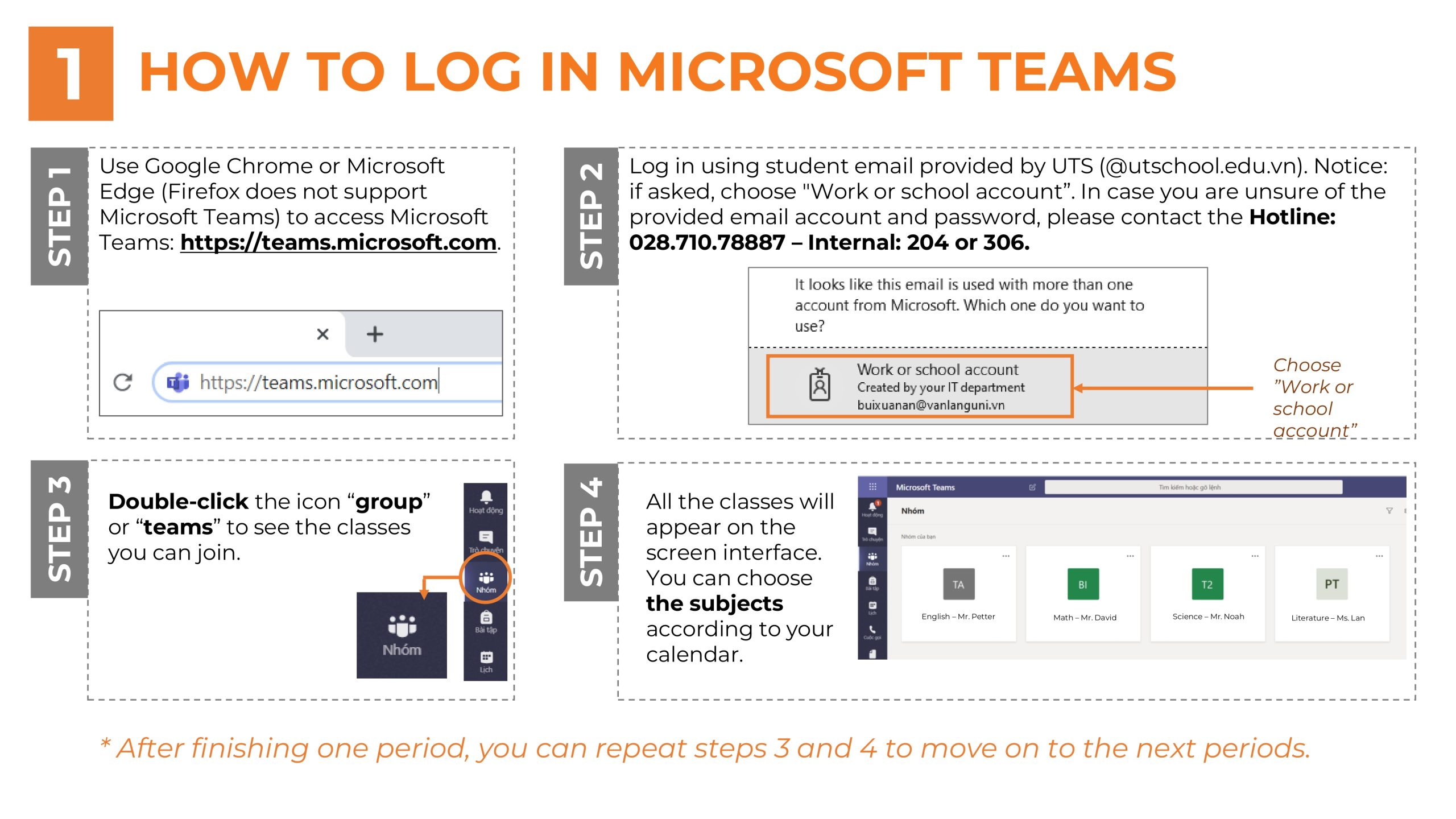
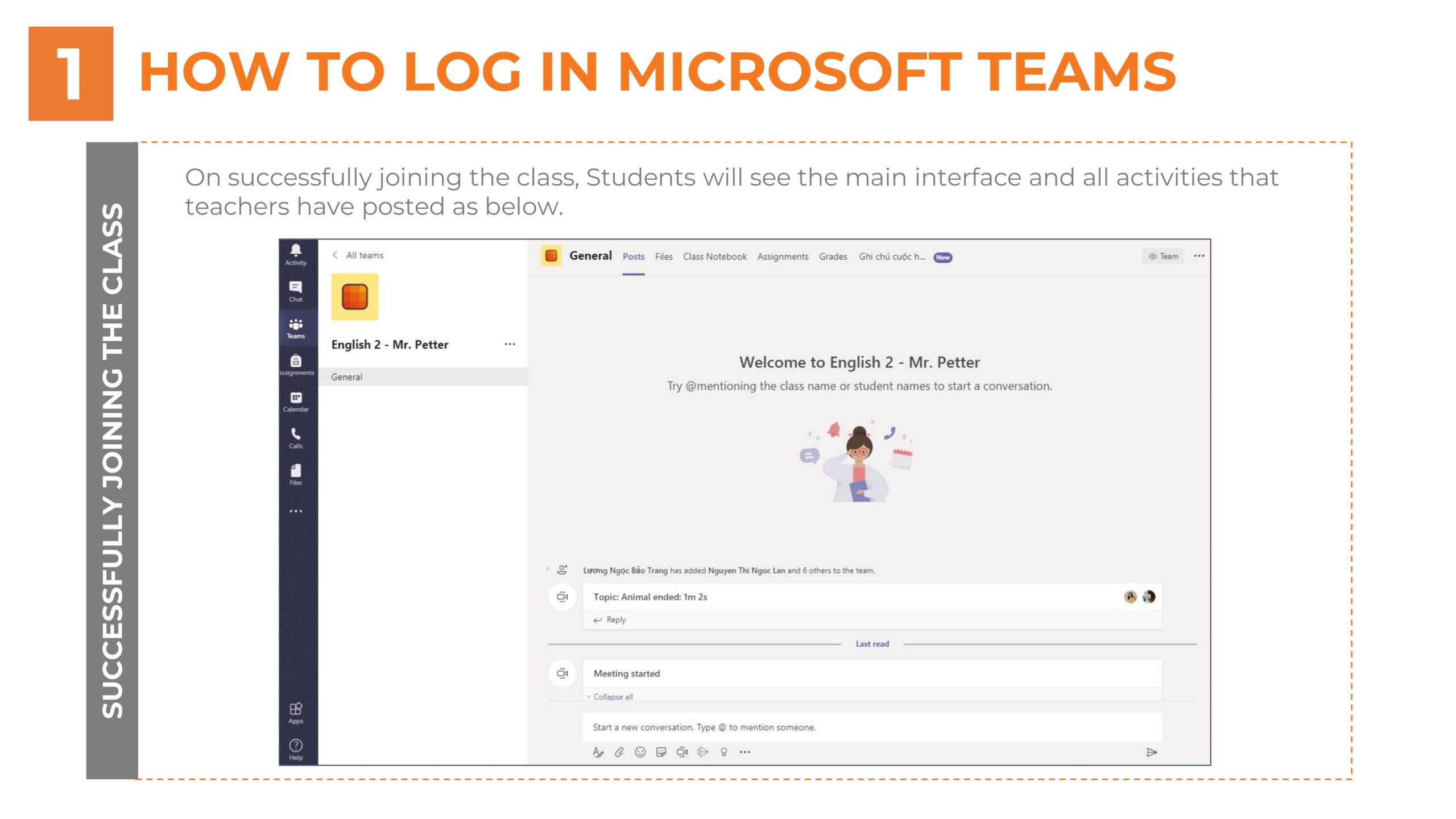
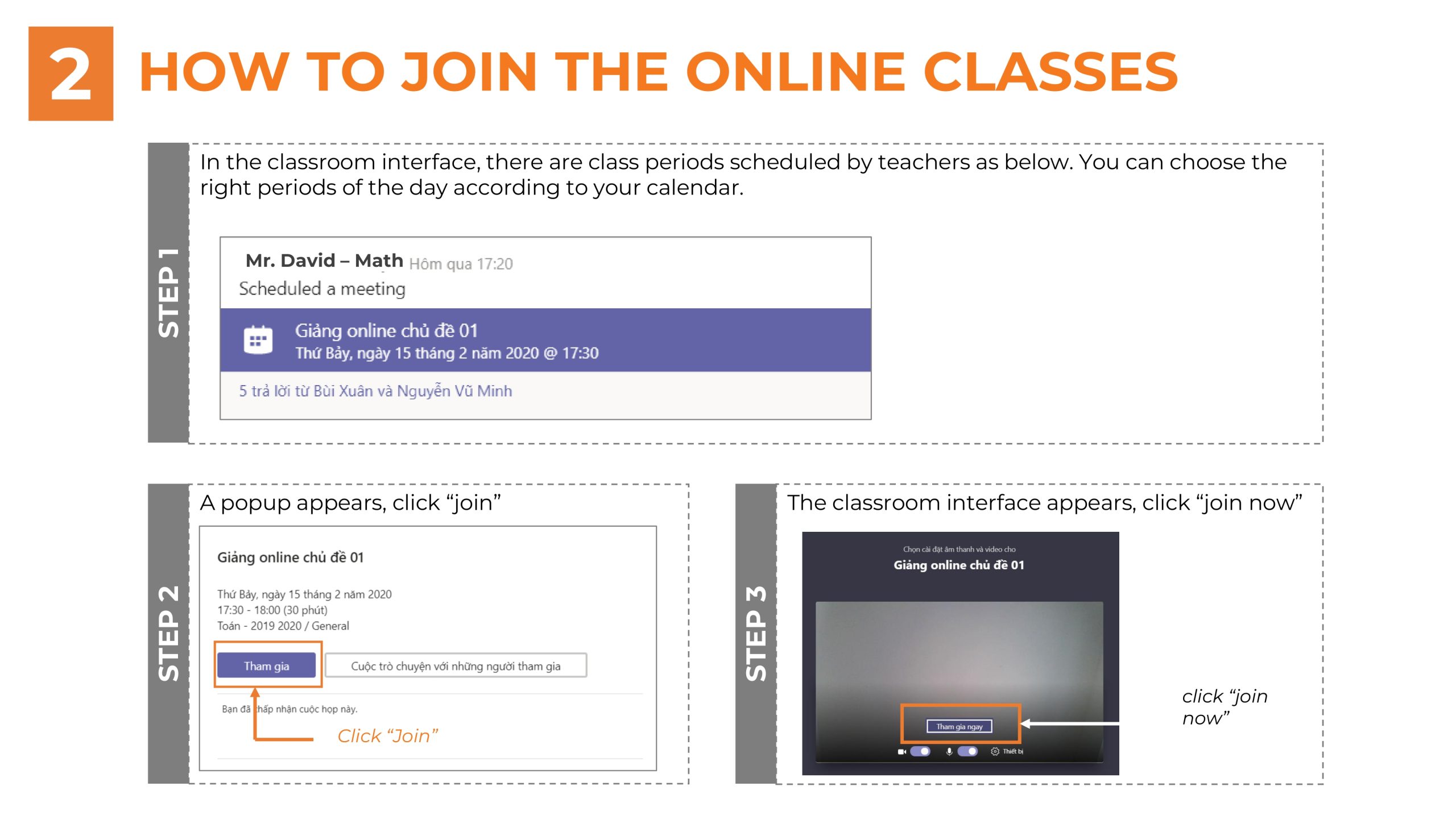
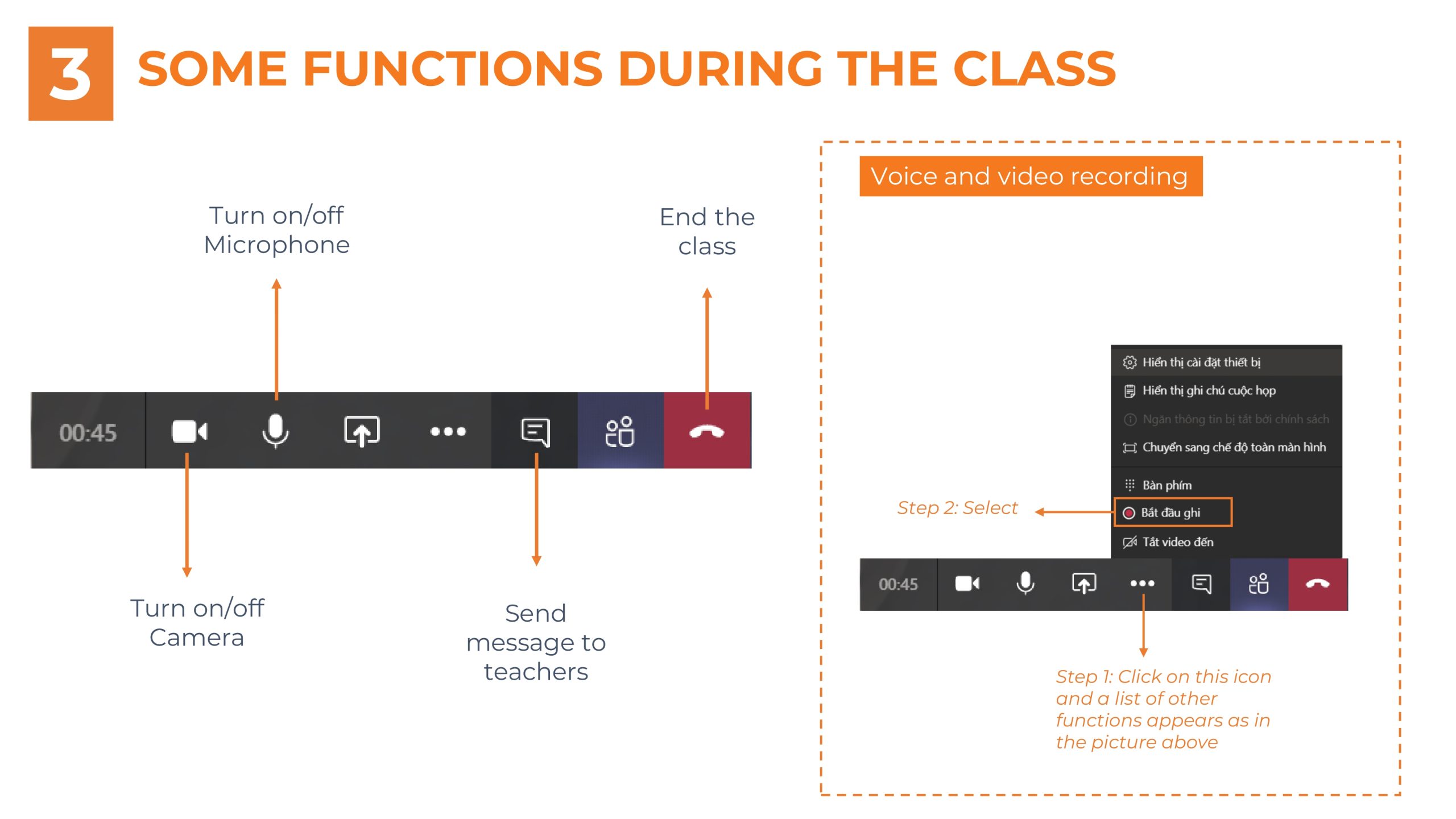
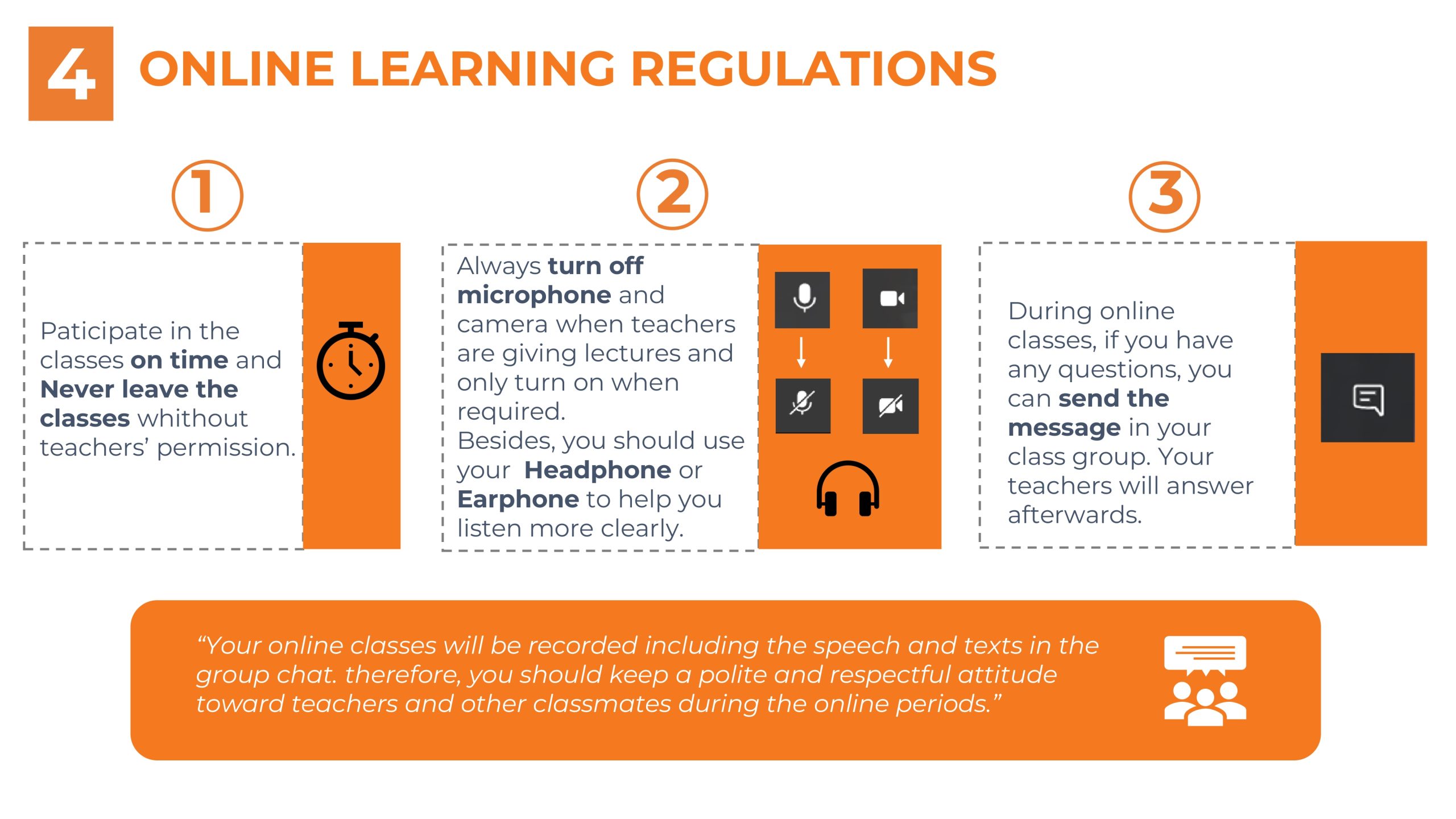
PREPARE EQUIPMENT AND LEARNING SPACE
Required devices when participating in online learning include computer (desktop or laptop) with a built-in camera, microphone, and stable internet connection.
The learning space should be quiet, without background noise such as TV, talking and music.
CLASSROOM REGULATIONS FOR ONLINE LEARNING
Always leave your camera on and only turn it off with your teachers’ permission.
Always turn off your microphone when your teachers are giving lectures and only turn it on when permitted.
During the learning session, if you have any questions, send it to the inbox of your class. Your teachers will answer afterwards.
Your class sessions are always recorded including speech and texts in the group chat; therefore, keep a polite and respectful attitude to your teachers and classmates.
REQUIREMENTS FOR ONLINE LEARNING
Secure your accounts, in case of losing your account, report to your homeroom teacher or the School Office right away.
Follow the calender updated by your homeroom teacher.
Log in your account 2-5 minutes before the online learning starts.
Be well-prepared with your school supplies and read your materials (if any) beforehand.
Dress politely, sit properly and stay focused.
Do not use any applications other than the ones your teachers require you to use in the online learning.
Completely log out of your account once the sessions are finished.
Inform your teachers at once when feeling unsafe and insecure during the online learning session.
In some necessary cases, your may be required to go to school by your teachers.
OBJECTIVE
UTS applies technology in teaching as one of the ways to enhance the school’s training goals and equip students with the necessary skills, knowledge and behaviors to become responsible 21st century citizens. To effectively integrate 21st century skills like collaboration, communication, creativity and critical thinking in student learning, UTS connects students to the school’s wireless network and allows you to use your personal electronic devices for online access on campus. Students are expected to commit to the responsible use of electronic devices, regardless of school computers or personal electronic devices.
Students should also understand that abuse of the above rights may result in forfeiture of your own benefits. Students are expected to be responsible for using your personal device with an internet connection, as follows:
To support learning activities under the guidance of teachers.
n a manner that respects the values of other students and is consistent with the school’s core values (e.g., students may not bully online, post and share personal material and images of other students).
Access to age-appropriate content.
Access documents and confirm/cite appropriate references.
During the school year, the school may have to amend the provisions of the policy. The school will provide written notice to parents of these corrections within 30 days prior to the effective date of these corrections.
TYPES OF EQUIPMENT
For the purpose of defining these regulations, the term “personal device with network connection” in this document shall include, but is not limited to, laptops, mini-laptops, smartphones and tablets.
TERMS AND CONDITIONS
Parents are required to register with the School Office a list of personal network-connected devices owned by students at the beginning of the school year and update each time there is a change.
At the beginning of each school day, students need to register for personal device storage with a network connection in class to preserve your devices. Personal devices with network connection will be returned by the teacher after storage time. Details of registration hours for personal device storage with network connection are as follows:
07:45 – 16:45 every Monday to Thursday
07:45 – 15:30 every Friday
OTHER REGULATIONS
Students are not allowed to arbitrarily use personal devices connected to the network in the classroom unless there is direct instruction f rom the teacher for a specific learning activity.
Students must get permission f rom your teacher before using personal devices with internet connection in classroom activities.
Students are only allowed to use personal devices with internet connection for the purpose of learning activities during class time.
Students must stop using, turn off, and put away their personal internet-connected devices immediately when requested by the teacher.
Students should be aware that the use of a personal internet-connected device in class can be a source of distraction for classmates, especially when the device emits sound. In these cases, students need to use headphones under the guidance of the teacher.
STUDENTS’ RESPONSIBILITY FOR PERSONAL EQUIPMENT
UTS is not responsible for any personal property brought to school, including unregistered and/or off-hours personal devices with a network connection. These devices are not under our management.
Students should take appropriate measures to protect and manage personal network-connected devices f rom damage or loss.
Students should take the following precautions to preserve your own belongings:
Students should NEVER leave a personal device with a network connection out of control at any time;
Personal devices with a network connection that are found to be out of control will be confiscated by school staff and sent to the Superintendent;
Students are required to see the Superintendent before receiving the device back.
ACCESS CONTROL
Students can only access the internet and connect to the school’s wireless network, using an account that the school has specifically provided to the student. Any student found connecting a personal device to the network using an Ethernet cable plugged into a wall outlet without the teacher’s permission will forfeit your own right to connect to the school network.
Students shall not access or knowingly gain access to any computer, computer system, computer network, information storage medium, or peripheral device without the consent of the teacher or authorized staff.
The school has a system in place that filters information for all access on personal devices with an internet connection. Any attempt to intentionally go beyond the limits set by the network screening system (e.g. through a Virtual Private Network) is strictly prohibited.
CLUB ECO-SYSTEM
In order to ignite student’s potentials and interests, clubs at UTS are categorized into 4 groups: Thinking, Art, Sport, and Skill. The club catergory is updated regularly every school year. Parents and Students please wait for the School’s further notice and instruction to register for clubs.
CLUB RULES AND REGULATIONS
Students participating in the club must comply with the following rules and regulations:
Join the club on time and regularly;
Students are allowed to register to join up to 02 (two) clubs, but ensure your physical health and academic performance;
Students may not arbitrarily change or leave the club without the permissions of the teacher in charge of the club and the homeroom teacher;
Students must concentrate, and follow the teacher’s instructions;
Students need to unite and help each other during practice and activities;
Students should confidently and proactively contribute ideas;
Students are required to preserve the school’s tools and property.
PURPOSE
Every year, the UTS Student Council members are re-elected to represent the UTS community with the purpose of:
Uplifting the spirits and delivering positive messages among UTSers.
Creating a practical training environment for students to show leadership, ability to coordinate tasks as well as scientifically improving teamwork skills.
Acting as a bridge between students and the school, listening, collecting ideas and solving students’ problems regarding learning, school life, activities and events.
STUDENT COUNCIL STRUCTURE

STUDENT COUNCIL ROLES
| No. | Position | Responsibilities |
| 1 | President | Generally coordinating USC projects. Leading meetings, managing and working directly with other members in USC Be a spiritual leader, inspire, trigger the creativity and working spirit for USC & UTS members Represent for the UTS community and become USC’s official spokesperson in f ront of the entire school |
| 2 | Vice President | Coordinating USC projects, managing and working directly with the other people in USC Inspiring and stimulating the creativity & working spirit of USC and UTS members Taking the role of the President in leading the meeting, and making the official statement of USC in case of President’s absence |
| 3 | Secretary | Recording minutes of meetings, collect & store information Arranging & coordinating internal and common calendars Ensuring the transparency of information within USC |
| 4 | Head of Media | Be mainly responsible for organizing and coordinating communication campaigns by USC Consulting & approving the content of USC’s messages to students, teachers, and school community Building communication culture and positive communication among UTSers |
| 5 | Head of Events | Be mainly responsible for organizing and coordinating communication events hosted by USC Planning USC events and ensuring tasks are done correctly and adequately Building a culture of autonomy and commitment among UTSers |
| 6 | Head of Finance | Estimating, tracking, and reporting the budget Managing the revenue and expenditure of USC activities In charge of logistics Managing and building a positive work spirit within the team |
STUDENT COUNCIL ELECTION
Participants: students from grade 5 to grade 11:
From grades 5-9: nominate 1 student for the student council.
From grades 10-11: nominate 3 students for the student council.
Candidate Criteria:
Leadership
Good study results
Able to communicate fluently in English
Able to organize and work in a team
Yearning for self-development and learning new things
Eloquence and confidence in front of the public
Good listening skills, and conflict resolution
Ready to challenge yourselves and not afraid of making a difference
Passion for creativity and desire for self-development
UTS Van Lang Complex
UTS Botanique Campus
Parental involvement is key to student success. Families are respected and recognized for the vital role they play in the ongoing wellbeing and learning of their children. Therefore, it is very important to build and maintain effective Parents- School communication. At UTS, we welcome all Parents to keep in close contact with the School about their questions and concerns and also constructive feedback.
PARENT CONTACT INFORMATION
Parents must provide the school with up-to-date contact information of at least 02 (two) people, including home and mobile phone numbers, mailing address (permanent, current, and emergency contact information), and email address(es). Please update School Front Office as soon as possible in case of changes for the school-parent communication not to be interrupted.
KEY CONTACT CHANNELS
INTEGRATED LEARNING PLATFORM MANAGEBAC
ManageBac is a leading learning management system used in international schools all over the world. ManageBac provides strong support for curriculum development, assessment, and reporting. Furthermore, ManageBac aids in strengthening the bond between the school, Parents, and students.
The Central Care Office: office@utschool.edu.vn receives and processes issues regarding operations and parental concerns.
SMS
SMS is only used to remind Parents to view information on ManageBac/email or to communicate urgent information.
HOTLINE
Central Care Office: 028 710 27788 – Ext. 1
The school website: www.utschool.edu.vn is the official channel where Parents can find general information about the school, facilities, staff, and academic program. Parents can also visit the school website for the latest timetable, event calendar, news, and monthly meal menu.
The school’s Facebook page promotes student achievement and highlights photos and videos of student activities at UTS. The school recommends that, when Parents have any ideas, questions, or concerns, please contact the teacher or the School Management to contribute instead of posting them on social media without sufficient accurate information.
PARENT CONFERENCES
The School organizes regular conferences between the Parents and the School or the Parents with the Head Teachers and Subject Teachers. These events’ schedules are usually noted in the academic calendar of the school year, but are subjected to change according to later development. In addition, Parents can meet with teachers, Vice Principals, or Principal by making appointments in advance with the School Front Office.
SEMINARS
The School periodically organizes seminars on many different topics with the participation of leading experts that will give consultations or answer Parent’s questions. The purpose of these seminars is to keep Parents up-to-date with the new educational trend, share experiences in nurturing and caring for students, and cooperating with the School in supporting the educational journey of each student.

